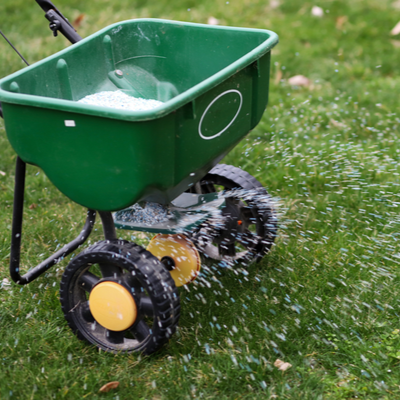Summer is in full effect in Southern Mississippi and Northern Tennessee, and while we are outside enjoying all the warm air has to offer, several types of beetles are scouring out your lawn looking for a place to lay their eggs. Eggs that eventually turn into grass munching and lawn damaging larvae. How can you stay vigilant and help protect your property? Read on to find out!
Grub Identification and Damage
Grubs are the larvae of several different species of scarab beetles. While the adults are harmless, the young have giant-sized appetites, and your grass is their favorite meal. They range from white to gray to brown in color and range anywhere from 3/8 to 2 inches long. They are hard to see, but if you find one, chances are it will be curled up into a C-shaped position. Here in Tennessee and Mississippi, our white grubs spend about ten months in the ground and live approximately one to three inches below the surface of the lawn. As they hatch and grow, they feed on your grass’s tender roots, which will eventually cause it to turn brown, wither and die.
To make matters worse, because moles, skunks, and birds feed on grubs, they may tear up and destroy your grass in search of their next meal.
Time of Year to Look Out for Grubs
Effects of their munching can be seen in late summer from August through September when they mature into adults and emerge to feed on the foliage of trees and shrubs. When they are finished, they lay a new batch of eggs on your turf, ensuring you will end up having them again next year.
Signs Your Tennessee or Mississippi Lawn Has Grubs
Because they are so tiny and live beneath the surface of your lawn, grubs can be hard to spot. Therefore, other than prevention, your best mode of protection against these grass terrorizing creatures is to know and recognize the symptoms. If you aren’t able to prevent them, early detection can help you put an end to them before too much damage has been done. Here are a few of the dead giveaways that grubs are invading your turf:
- Your grass feels spongy and very soft
- Sections of your grass roll up like carpet when stepped upon or kicked
- Death of otherwise healthy plants
Damage caused by moles, raccoons, skunks, or other medium-sized animals.
How to Check Your Lawn for Grubs
If you want to be sure before calling in the professional, you can take a shovel and dig up a small section of your lawn where grubs are suspected. Be sure to check a few spots. If your grass is experiencing an infestation, you will spot them. Another way to look for these pesky lawn destroyers is by tugging on a soft, spongy area of your grass. If it pulls up like a piece of carpet, chances are, you have a grub problem.
Grub Prevention
Preventing grubs is not always easy. Like us, they have to survive, and they are always on the move looking for their next target. However, a healthy and robust lawn will be better equipped to fight off an infestation should one occur. The first step in preventing grubs is to invest in a year-round lawn fertilization program. Providing your lawn with adequate nutrients and minerals will give it the food it needs to stay strong and fight off diseases and pests. Other ways you can help to prevent a grub takeover include: 
- Raise the blade on your lawnmower. Keep your grass at least two inches high to make the grubs work harder. They will give up and move onto a different yard.
- Grubs are attracted to moisture and humidity. Therefore, switch up your irrigation schedule and consider watering your lawn once a week for a bit longer. Allow it to dry out in between waterings.
- Once you have grubs, the chances of them coming back increase. Start keeping an eye out for the swarms of brown, half-inch long beetles surfacing your lawn around dusk between June and July. If you see them, you can still prevent the young from hatching through insecticides. Because using insecticides takes precision and accuracy, we recommend utilizing a professional lawn care company with the knowledge and training needed.
For Ultimate Grub Control, Contact the Professionals at Greenkeeper
The professionals at Greenkeeper offer the help and control you need to have a lush, glorious lawn all summer. We provide an eight-step lawn care program that includes the fertilization necessary to help your grass thrive and remain strong. In addition, we offer both a preventive and curative grub control service. Our preventive grub control will help prevent these hungry critters from invading your lawn, while our curative is beneficial once grubs have already been established.
Visit our website to learn more, or contact us. You may also give us a call. Our friends who live in Tennessee can reach us at 901-861-2338. Live in Mississippi? We have a number for you as well, 662-895-2088.
Did you find this article helpful? Feel free to check out our other blog articles for additional tips and ideas. Then, check us out on Facebook.
We look forward to working with you soon.
